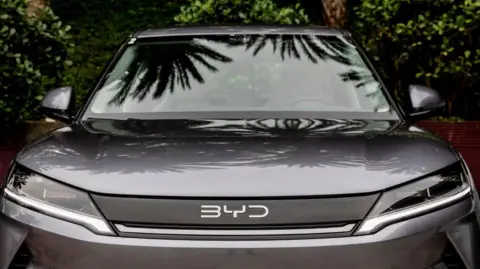In a significant development, Brazilian authorities have put a halt to the construction of a factory owned by the Chinese electric vehicle manufacturer, BYD (Build Your Dreams). This decision stems from serious allegations regarding the worker conditions on site, which have been described as comparable to “slavery.” The Public Labour Prosecutor’s Office (MPT) reported that more than 160 workers were rescued from deplorable living conditions in Bahia, a northeastern state of Brazil, where they were employed by Jinjiang Construction Brazil, the construction firm managing the site.
The MPT’s findings revealed that workers were forced to live in what can only be described as degrading conditions. They faced multiple issues, including the confiscation of their passports and salaries, which directly impeded their freedom and financial security. Reports indicated that these workers were made to sleep on beds devoid of mattresses at one of their housing facilities. Additionally, facilities were shared among a staggering 31 workers, necessitating that they rise extremely early to meet their work schedules. The MPT detailed that workers were living in unacceptable circumstances and underscored that such conditions constitute “slavery-like” situations, as defined under Brazilian law, which prohibits debt bondage and any work that undermines human dignity.
In response to the unfolding situation, BYD swiftly cut ties with the contracting firm implicated in these labor violations and emphasized its commitment to adhering fully to Brazilian laws. The company’s statement reassured that it is dedicated to providing a respectful environment for all its employees. Following the intervention from the authorities, the affected workers have reportedly been relocated to hotels while the investigation and subsequent actions unfold.
Originally, the factory was set to commence operations by March 2025 and was poised to be BYD’s inaugural electric vehicle manufacturing site outside of Asia. This venture had been part of the company’s strategic push in Brazil, which serves as its largest market outside its home country. BYD initially established its presence in Brazil with a factory in São Paulo in 2015, primarily focusing on manufacturing chassis for electric buses. Last year, the company had announced a major investment of 3 billion reais (approximately $484.2 million) for expanding its manufacturing capabilities to include electric vehicles.
The market dynamics for electric vehicles, particularly in China, have been significantly influenced by government subsidies propelling the trade from internal combustion engine vehicles towards EVs. Yet, this aggressive expansion strategy has drawn criticism and sparked backlashes in international settings due to perceived unfair competitive advantages given to Chinese automakers. In recent months, markets such as the U.S. and the European Union have implemented tariffs on Chinese EVs as a potential countermeasure against what they deem as disproportionate support for domestic manufacturers.
The decision to close the factory becomes a severe toll not only on BYD’s operational plans but also signals a larger discourse surrounding labor rights and working conditions globally, particularly in developing markets. BYD’s proactive response to the situation underscores a commitment to due diligence and compliance amid significant scrutiny.
As BYD grapples with these challenges, the implications of their expansion strategy in Brazil remain to be seen. The construction of the factory is consequential for both BYD’s growth and for the future landscape of electric vehicle manufacturing in Latin America. This incident strengthens the resolve among authorities to maintain vigilance on labor practices, protecting workers’ rights while ensuring that businesses adhere strictly to legal frameworks governing workplace conditions. The ramifications of this situation could shape BYD’s approach to future investments and collaborations, emphasizing the importance of ethical practices in international business endeavors.



